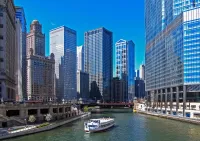Bilbao is the largest city in the Basque Country and Biscay province, located in northern Spain. As of 2024, its population stands at 347,342, making it Spain's 11th-largest city. The Bilbao metropolitan area, with over a million residents, is the most populous in northern Spain. Bilbao serves as the primary urban center within the Greater Basque region and the fifth-largest urban area in Spain.
1900: Population Increase
In 1900, Bilbao's population dramatically increased to 80,000, up from 11,000 in 1880.
1901: Establishment of the Bank of Biscay
In 1901, the Bank of Biscay (Banco de Vizcaya) was established in Bilbao.
1902: Construction of exterior port begins
In 1902, construction began on an exterior port at the mouth of the estuary in Santurtzi.
1902: Steelmaking industries flourished with the creation of many new factories
In 1902, steelmaking industries in Bilbao flourished with the creation of new factories, including Santa Ana de Bolueta and Altos Hornos de Vizcaya.
1907: Establishment of the Municipal Savings Bank of Bilbao
In 1907, the Municipal Savings Bank of Bilbao (Caja de Ahorros Municipal de Bilbao) was established.
1908: Opening of Basurto Hospital
In 1908, the Basurto Hospital, located in the Basurto-Zorroza district, was opened after ten years of construction. It was built due to the fast increase of population in the late 19th century.
1911: Implementation of Athletic Bilbao's Basque policy
Since 1911, Athletic Bilbao has had a Basque policy in place, with only players born in or having a clear connection to the Basque region being allowed to represent the club.
1921: Establishment of the Provincial Savings Bank of Biscay
In 1921, the Provincial Savings Bank of Biscay (Caja de Ahorros Provincial de Vizcaya) was established.
1925: Annexation of Deusto to Bilbao
In 1925, the then independent municipality of Deusto was annexed to Bilbao.
August 1936: First bombing of Bilbao
On August 31, 1936, Bilbao suffered its first bombing during the Spanish Civil War by Nationalist bombers.
May 1937: Nationalist army besieged the town
In May 1937, the Nationalist army began besieging Bilbao during the Spanish Civil War. The battle lasted until June 19th, when the city fell.
1947: Strike of the Euskalduna shipyard
In 1947, the strike of the Euskalduna shipyard marked the first social movement during the Francoist dictatorship in Bilbao.
1948: First commercial flight took off from the local airport
In 1948, the first commercial flight took off from the local airport in Bilbao as the city was being rebuilt after the war.
1950: Construction of the Deusto canal begins
In 1950, construction began on the Deusto canal, an artificial waterway intended to facilitate navigation, sparing ships from the natural curves of the estuary.
July 1959: Creation of ETA
On July 31, 1959, the separatist organization ETA was created from Basque nationalist movements in Bilbao.
1960: New neighbourhoods created to stop the increasing problem of slums
In the 1960s, Bilbao created new neighborhoods such as Otxarkoaga to address the increasing problem of slums.
February 1963: Record low temperature in Bilbao
In February 1963, Bilbao recorded a minimum temperature of −8.6 °C (16.5 °F).
June 1968: Establishment of the University of Bilbao
In June 1968, the University of Bilbao, the first public university, was established; it would later become part of the University of the Basque Country.
1968: Deusto canal construction nears completion
By 1968, the Deusto canal project was nearing completion, but was stopped with 400 meters left to finish.
1968: Foundation of Petronor
In 1968, Petronor, a large oil company, was founded in Bilbao. It produces all oil-based fuels distributed in the whole metropolitan area.
1968: Establishment of the University of Bilbao
In 1968, the University of Bilbao was established, later to become the University of the Basque Country in 1980.
1979: Statute of Autonomy of the Basque Country
In 1979, with the approval of the Statute of Autonomy of the Basque Country, Vitoria-Gasteiz was elected as the seat of the government.
1980: University of Bilbao becomes the University of the Basque Country
In 1980, the University of Bilbao became the University of the Basque Country.
1982: Peak population in Bilbao
In 1982, Bilbao reached a peak of 433,115 inhabitants before municipalities of the Txorierri valley were removed.
August 1983: Flooding during Aste Nagusia
On August 26, 1983, during the Aste Nagusia festivities, the estuary overflowed due to continuous rain, causing significant destruction and two deaths.
1988: Merger creating BBV
In 1988, the Bank of Bilbao and the Bank of Biscay merged, creating the BBV.
1990: BBK formed by savings banks merger
In 1990, the Municipal Savings Bank of Bilbao and the Provincial Savings Bank of Biscay merged to form the Bilbao Bizkaia Kutxa (BBK).
1990: Otxarkoaga-Txurdinaga new district
In the 1990s, Otxarkoaga and Txurdinaga were joined together as a new district, Otxarkoaga-Txurdinaga.
1992: Creation of Iberdrola
In 1992, Iberdrola, a multinational electric utility company, was created after the merging of Iberduero and Hidroeléctrica Española. Its headquarters are located in Bilbao.
1995: Establishment of Bilbao metro
In 1995, the Bilbao metro was established, operating two underground lines (Line 1 and Line 2) with some overground sections. Also in 1995, Line 1 was built largely following the same route as the Bilbao-Las Arenas railway, which was still active by the time the Metro system opened.
1999: Creation of BBVA
In 1999, BBV merged with Argentaria bank, creating the current multinational corporation, the BBVA.
1999: Iñaki Azkuna becomes mayor
In 1999, Iñaki Azkuna became the mayor of Bilbao and served until his death in 2014.
2000: Urban renewal projects continue
In 2000s, Bilbao continued deindustrialization and transition to a service economy, supported by investment in infrastructure and urban renewal.
December 2002: Opening of new tram system
On December 2002, a new tram system was opened, almost forty years after the closing of the original system. The line follows the estuary of Bilbao across the central districts of the city.
May 2006: Acciona Trasmediterranea service begins
On May 2006, a service operated by Acciona Trasmediterranea began serving the route from Santurtzi, near Bilbao, to Portsmouth (UK).
April 2007: Acciona Trasmediterranea service ends
In April 2007, the Acciona Trasmediterranea service which ran from Santurtzi, near Bilbao, to Portsmouth (UK) ended.
2007: Number of nationalities registered in Bilbao
As of 2007, there were 127 different nationalities registered in Bilbao.
2007: Plan approved to continue the Deusto canal
In 2007, a plan was approved to continue the construction of the Deusto canal and form the island of Zorrozaurre.
2008: Municipal Transparency Prize
In 2008, Bilbao won the Municipal Transparency Prize, awarded by Transparency International.
2008: Basurto Hospital named best in customer support
In 2008, the Basurto Hospital was named the best hospital in customer support in Spain.
2009: Bilbao second in Transparency ranking
In 2009, Bilbao came second after Sant Cugat del Vallés in the Municipal Transparency Prize ranking.
2009: Bilbao Population Demographics
In 2009, out of 355,731 people residing in Bilbao, only 114,220 were born inside the municipality.
May 2010: Lee Kuan Yew World City Prize
In May 2010, Bilbao was recognised with the Lee Kuan Yew World City Prize by Singapore.
June 2010: Lee Kuan Yew World City Prize Awarded
On June 29, 2010, Bilbao received the Lee Kuan Yew World City Prize.
September 2010: P&O Ferries service withdrawal
On September 28, 2010, P&O Ferries withdrew its service from Santurtzi, near Bilbao, to Portsmouth (UK), which was operated with a ship called the Pride of Bilbao.
2010: Bilbao wins Municipal Transparency Prize
In 2010, Bilbao won the Municipal Transparency Prize from Transparency International for the second time.
2010: Bilbao Basket runner-up of the Liga ACB
In 2010–2011 season, Bilbao Basket was the runner-up of the Liga ACB.
2011: Bilbao Basket runner-up of the Liga ACB
During the 2010-2011 season, Bilbao Basket was the runner-up of the Liga ACB, losing the final series 3-0 against FC Barcelona Bàsquet.
2012: Bilbao Basket runner-up of the EuroCup Basketball
During the 2012–2013 edition, Bilbao Basket was the runner-up of the EuroCup Basketball.
2012: Kutxabank formed by Basque financial entities merger
In 2012, Bilbao Bizkaia Kutxa (BBK) merged with other Basque financial entities to form Kutxabank.
2012: Iñaki Azkuna awarded World Mayor prize
In 2012, Iñaki Azkuna was awarded the World Mayor prize.
2012: Iñaki Azkuna receives the 2012 World Mayor Prize
In 2012, Iñaki Azkuna, mayor of Bilbao, received the World Mayor Prize.
January 2013: Iñaki Azkuna receives the 2012 World Mayor Prize
On January 7, 2013, Mayor Iñaki Azkuna received the 2012 World Mayor Prize for Bilbao's urban transformation.
2013: Opening of new San Mamés stadium
In 2013, the new San Mamés stadium opened, seating 53,332 spectators. It is the home stadium of Athletic Club, also known as Athletic Bilbao.
2013: Bilbao Basket runner-up of the EuroCup Basketball
In the 2012-2013 edition, Bilbao Basket was the runner-up of the EuroCup Basketball, where they lost to the Russian team Lokomotiv Kuban.
2014: Ibon Areso replaces Iñaki Azkuna as mayor
In 2014, upon the passing of Iñaki Azkuna, Ibon Areso replaced him as the mayor of Bilbao.
2014: Mondragon University establishes presence in Bilbao
Since 2014, Mondragon University has had a presence in Bilbao through the innovation and entrepreneurial centre Bilbao Innovation Factory.
2015: Foundation of Dantzerti
In 2015, the offer of higher education in the city was expanded with the foundation of Dantzerti, the Higher School of Dramatic Arts and Dance of the Basque Country.
April 2017: Inauguration of Line 3 of the metro
On April 2017, Line 3 of the metro was inaugurated. It is operated by Euskotren Trena, which also operates the regional services to Durango and Eibar as well as a commuter rail line that connects the centre of Bilbao with Lezama and the Txorierri valley.
November 2017: Best European City 2018
On November 8, 2017, Bilbao was chosen as the Best European City 2018 at The Urbanism Awards 2018.
2018: Bilbao named Best European City 2018
Bilbao was named the Best European City for 2018 at The Urbanism Awards in November 2017.
2019: Municipal election results
In the 2019 municipal election, the Basque Nationalist Party secured 14 seats, the Socialist Party of the Basque Country 5 seats, EH Bildu coalition 4 seats, Udalberri 3 seats and the People's Party 3 seats.
August 2023: Record high temperature in Bilbao
In August 2023, Bilbao recorded a maximum temperature of 44.0 °C (111.2 °F).
2024: Foreign-born population in Bilbao
As of 2024, the foreign-born population of Bilbao is 56,629, representing 16.3% of the total population.
2024: Bilbao population
In 2024, Bilbao had a population of 347,342, making it the 11th-largest city in Spain.
2024: Population of Bilbao in 2024
In 2024, the population of Bilbao is 347,342 people.
2027: Construction of new underground station
In 2027, the construction of a completely new underground station is expected to begin. This new station will replace the current infrastructure at Bilbao-Abando and merge Abando and Concordia into a single station.
2038: Basque Y high-speed train network connection
Around 2038, the Bilbao-Abando station is expected to connect to the Basque Y high-speed train network. This will enable high-speed AVE trains to operate between the Basque capitals and other Spanish cities.
Mentioned in this timeline

Basketball is a team sport played on a rectangular court...

Guns N' Roses an American hard rock band formed in...
FC Barcelona or Bar a is a professional football club...

Barcelona is a major city located on the northeastern coast...

Chicago is the most populous city in Illinois and the...

Music is a cultural universal involving the arrangement of sound...
Trending

1 hour ago Peyton Stearns vs Kimberly Birrell: ATX Open 2026 Prediction and Odds

1 hour ago Alexis Wilkins, Kash Patel, and alleged FBI perks stir controversy and public scrutiny.

1 hour ago Starling Marte and the Royals: Agreement Reached, Possible Contract, Free Agency

2 hours ago Six Flags to Open World's Tallest Vertical-Loop Roller Coaster in Texas by 2026

2 hours ago Bill Nye Visiting Lehigh Valley, Winter Weather, ICE Protest in Pennsylvania.

2 hours ago Cadillac Names First F1 Car After Mario Andretti, Honoring Racing Icon's Legacy
Popular

Jesse Jackson is an American civil rights activist politician and...

Hillary Diane Rodham Clinton is a prominent American politician lawyer...

XXXTentacion born Jahseh Dwayne Ricardo Onfroy was a controversial yet...

Michael Joseph Jackson the King of Pop was a highly...

Barack Obama the th U S President - was the...

Kashyap Pramod Patel is an American lawyer who became the...